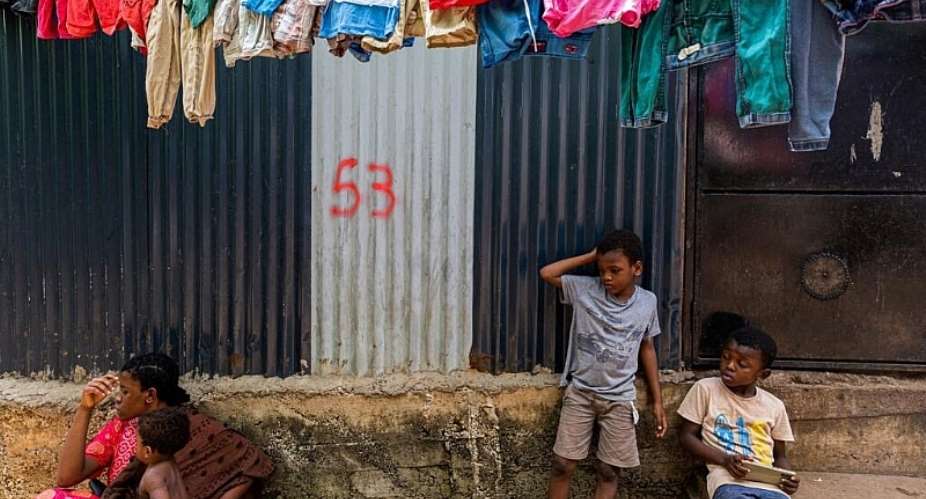Children born on the French Indian Ocean territory of Mayotte will no longer automatically qualify for citizenship of France, Interior Minister Gérald Darmanin announced during a visit to the overseas department on Sunday. The change is part of efforts to stem migration to Mayotte from neighbouring islands, amid flaring tensions between locals and immigrants.
Once the reform takes effect, only children born to French parents in Mayotte will have the right to French nationality.
Currently, children born in any part of France to two foreign parents can become French citizens as teenagers.
Darmanin called it a "radical decision" that would make Mayotte significantly less attractive to would-be immigrants.
The change will mean revising France's constitution to restrict the principle of "droit du sol" – the right to citizenship of a country by virtue of being born there – in the island territory.
No other part of France will adopt the new rule, Darmanin said.
Rising tensions
According to French national statistics office Insee, of 10,600 children born on Mayotte in 2021, close to half – 46.5 percent – had two parents who weren't French.
The department saw its population increase fourfold between 1985 and 2017, according to Insee, in a combination of a high birth rate and waves of immigration.
An archipelago with around 300,000 inhabitants, Mayotte is the poorest part of France – but incomes remain higher than in nearby Comoros, an island country that has been independent of France for some 50 years.
Thousands of Comorans fleeing the poverty of their homeland make the trip to Mayotte every year in search of higher living standards.
The influx has caused major tensions, with many Mayotte residents complaining about crime, poverty and the strain on resources as the islands grapple with a severe drought.
For the past three weeks, activists have been staging strikes and erecting roadblocks to protest. Among their demands is the dismantling of a refugee camp as well as an end to residence permits that prevent their holders from leaving the territory.
Immigration reform
Such permits, which allowed bearers to stay in Mayotte but didn't give them the right to reside in mainland France, will be scrapped, Darmanin announced on Sunday.
A package of bills to address the unrest in Mayotte will go before parliament in the coming weeks, the interior minister promised.
The government already subjected Mayotte to tougher citizenship laws than the rest of France, introducing a rule in 2018 that at least one parent had to reside there legally for more than three months before their child's birth for the child to qualify for French nationality.
No such condition applies elsewhere in France.
However, the government recently tightened its nationwide rules on the way children of foreign parents acquire French nationality as part of a broader reform of immigration law – ending the process of granting citizenship automatically at 18 and instead requiring children to formally request it.
Security surge
In April 2023, the government launched "Operation Wuambushu" – a months-long police surge targeting slums, criminal gangs and undocumented immigrants in Mayotte, many of whom were deported to Comoros.
The Comoran government refused to take them back in, however, ratcheting up tensions between the country and France.
The interior minister's latest visit comes as part of preparations for "Wuambushu Two", he declared in a video posted to social media this weekend.
Darmanin was accompanied by France's newly appointed minister for overseas territories, Marie Guévenoux – as well some 15 officers from an elite police tactical unit sent to back up Mayotte's forces.





 Cecilia Abena Dapaah’s husband details monies stolen by house helps
Cecilia Abena Dapaah’s husband details monies stolen by house helps
 We didn’t exonerate Cecilia Abena Dapaah – OSP debunks AG’s claim
We didn’t exonerate Cecilia Abena Dapaah – OSP debunks AG’s claim
 SHS/SHTS students granted 4-day permission to partake in limited voter registrat...
SHS/SHTS students granted 4-day permission to partake in limited voter registrat...
 Businesses running away from Ghana due to ‘dumsor’, high cost of electricity – B...
Businesses running away from Ghana due to ‘dumsor’, high cost of electricity – B...
 ‘If 2024 elections are held today, Bawumia will win all regions except Volta’ — ...
‘If 2024 elections are held today, Bawumia will win all regions except Volta’ — ...
 IMANI petitions CHRAJ to investigate EC over premature retirement, disposal of l...
IMANI petitions CHRAJ to investigate EC over premature retirement, disposal of l...
 Exercise fiscal restraint to preserve sound public finances in this ‘great elect...
Exercise fiscal restraint to preserve sound public finances in this ‘great elect...
 Uncomfortable economic indicators driving multinational companies out of Ghana –...
Uncomfortable economic indicators driving multinational companies out of Ghana –...
 You whine too much; focus and exercise your powers – Sammy Gyamfi to Kissi Agyeb...
You whine too much; focus and exercise your powers – Sammy Gyamfi to Kissi Agyeb...
 Limited voter registration: GES grants 18-year-old SHS/SHTS students 4-day permi...
Limited voter registration: GES grants 18-year-old SHS/SHTS students 4-day permi...
